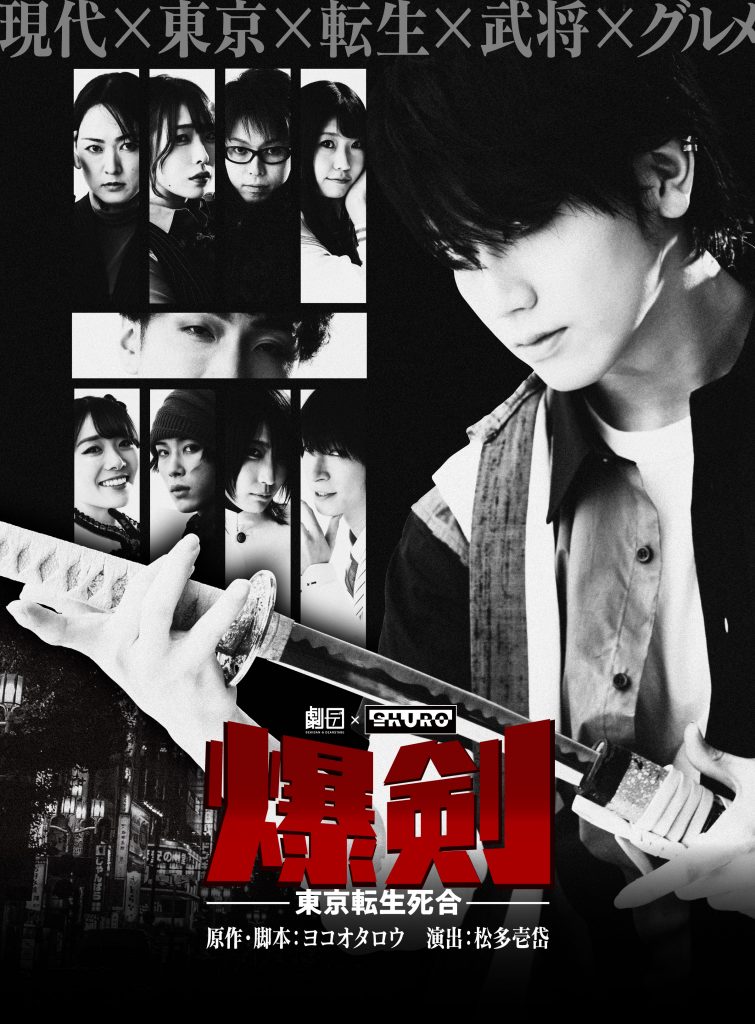
It’s almost been two months since the Bakuken 2 stage play debuted on February 23rd, and I haven’t had the time to really write anything about it. Unfortunately, one of the cast members was connected to a confirmed case of COVID, so the final five performances of the show were cancelled out of an abundance of caution to prevent the spread of the virus.
For those who might be wondering “What is ‘Bakuken’?”, I’d suggest you check out my initial article regarding the previous stage play here.
Since it’s almost been two months since I went to see the play for the first public performance, my memory of the details may have deteriorated slightly, but I have a copy of the script that I can refer to, to help me remember. So, this post may be a bit scattered and cover only a small fraction of the overall play.
First of all, as it was suggested in the previous play, Nobunaga and his goons were somehow able to traverse through time and enter the modern area of Tokyo… but not exactly through the normal portal through time. There was a bit of an error that affected Nobunaga as he traveled through time… he was effectively split into a nearly infinite number of copies, all of which awoke as any other normal human, with no memory of his prior life. It is these copies of Nobunaga that the reincarnations of the other characters are effectively seeking out to slaughter before he can completely awaken.
That means that the good guys from before are put into such a position in which they are willingly killing a potentially innocent individual… over and over again. Some of them are okay with this, for example, the reincarnation of Bokuden Tsukuhara (played by Kawabuchi Kaori) almost becomes the leader of the team hunting the reincarnated copies of Nobunaga.
The majority of the other reincarnated characters willingly follow Tsukuhara’s lead, except for the reincarnated Ono Zenki (played by Kuroki Fumitaka), who is a mere high school student in this time. No matter how evil this “Nobunaga” is supposed to be, he is unwilling to fight and kill his copies merely because he has the potential to become a horrible person. I couldn’t help but relate this idea to Hitler, and how people speculate about killing him as a baby, before he becomes such a conduit for mass murder and the like… but in that case, you’re effectively murdering an innocent child… and the moral conflict that revolves around this thought problem.
Speaking of Nobunaga (played by Mondo Ukai), he’s mostly a comical character throughout the play, often playing the role of a typical drunk salary man, but he also has a rather disturbing scene with the high school aged reincarnation of Ranmaru in which he tries to seduce and force himself on her. But on more of a light side, there’s a hilarious dance sequence of Nobunaga with his other copies… It’s likely one of the best highlights from the whole play, and I certainly laughed throughout the whole sequence.
Speaking of the funny scenes, it’s pretty well-known that there’s typically a scene in which the cast tries to make Oguri Ryo laugh, and these moments are absolutely GOLDEN!! There’s a scene between the Yagyuu boys, the reincarnated father and son team (played by Oguri Ryo and Sakuramachi Taro) in which they’re folding flyers at the high school… and the conversation goes from discussing how what they’re doing is so mundane and boring to Mitsuyoshi (the son, who has a complete father complex) incessantly groping and pinning Munenori, his father, to the ground. It’s difficult to explain in words, but it was absolutely hilarious to watch in person. It was one of the highest moments of the play.
Another major highlight for me was the “muscle” scenes with (played by Matsubara Rin). He plays Kondo, a homeless character who has many scenes with the likewise new Bakuken character Shiro (played by Tsurumi Moe). There was one specific scene where Matsubara intentionally rips off his clothing to expose his massive muscles. It was, for lack of other words, glorious! His exquisitely chiseled abs and arms are quite a sight to behold!
Speaking of Shiro, she mostly plays a giddy, scatter-brained hostess type of character who, unlike the other characters, doesn’t seem to be a reincarnated warrior from the past… until the very end. I don’t remember the details, but she apparently was executed as a witch or something similar and has carried her desire for revenge through into the afterlife and beyond. She instantly becomes the main antagonist who threatens the lives of everyone, even the copies of Nobunaga. I can’t recall exactly what causes her to calm down, but I believe it’s a mix between the efforts of Kondo & Ono that eventually bring her to her senses.
The reincarnation of Hiraga (played by Sato Tomohiro) is quite amusing again this time. This time, he’s a sort of online influencer and is constantly staring at his smartphone. There’s a scene in which he’s complaining about people downvoting his posts and he effectively blocks every one of the haters, saying 「アンチをブロック!」aka “Block the Hater!”
So, that’s all for now! I’m not completely finished with discussing the play, but I sort of need to go now, so I will continue with more later! Please stay tuned!!
